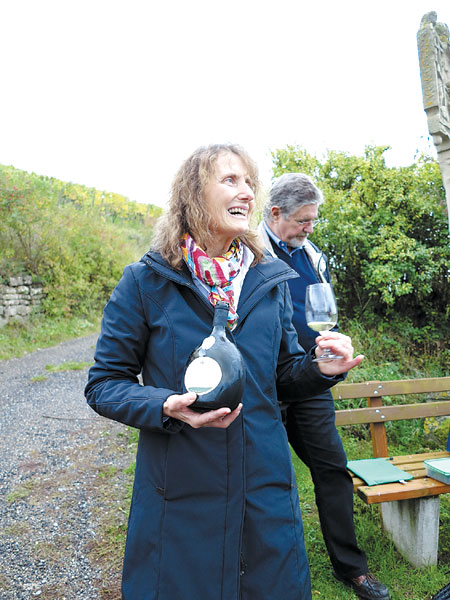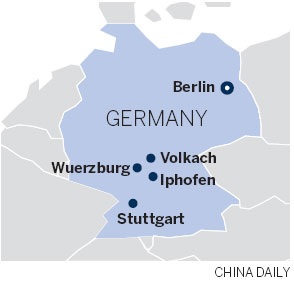Germany by the glass
 |
|
Gabi R. Rupp introduces local wine and grape varieties at the vineyards of the Beckstein village in Baden-Wuerttemberg. |
Next we are in Iphofen, another small Franconian town. With complete fortification walls and a population of 2,800, it is the center of an area with 4,500 residents - and about 10 percent of Franconia's vineyards and 23 wineries.
Most of the wine they make can be found at Vinothek, the two-story wine center in the town. With more wine to sample, I start liking the German wine, especially the white, very much.
About 3 percent of wine produced in the world is made in Germany, according to Horst Lommatzsch with German National Tourist Board, who is with us on the trip.
Most of German vineyards are family-run and small. Nearly 80 percent is sold in Germany directly from the vintners to customers, and only a few brands are sold abroad.
"Places like Vinothek are where we search for special wine," he says.
His introduction is confirmed by grape-growers at Beckstein, a wine village with 36 families and 450 residents at Lauda-Koenigshofen district in the federal state of Baden-Wuerttemberg.
Our local guide, Gabi R. Rupp has only a half-hectare vineyard and so she joins Beckstein Vintner's Cooperative.
At the village's vineyards, Rupp offers us newly-picked schwarzriesling (pinot Meunier) grapes - surprisingly sweet - and several Beckstein wines - all excellent and special.

She says that a winery needs at least 15 hectares of vineyards to maintain its operation.
It's hard for individual grape-growers to make a living by only growing grapes, she says. "We need another job," she says, adding that she works for the cooperative.
"Growing a hectare of vines can earn about 7,000 euros ($8,900) a year. But maintain trellises, pruning, harvesting ... are all hard work. So many young people are reluctant to carry on the business and they are leaving to big cities."
That may be why Lin Yisong got the chance to own an estate.
It produces about 100,000 bottles of wine a year.
Of the yield, only 10,000 bottles will be sold in the Chinese market, including 8,000 bottles that sell for 8 euro ($10) and 2,000 bottles priced at 25 euro ($32) in Germany. In China, the prices will be 200 yuan ($32) and 500 yuan respectively.
"They are mainly for friends and regular customers," he says.
Of the top 10 wine-producing countries in the world, he says, Germany is the only importer.
"Most of German wine are consumed by German people, like most of our products," he explains.
"If you want to drink German wine, the best way to do it is in Germany," says the tourism board's Lommatzsch.
Contact the writer at chenliang@chinadaily.com.cn.




















